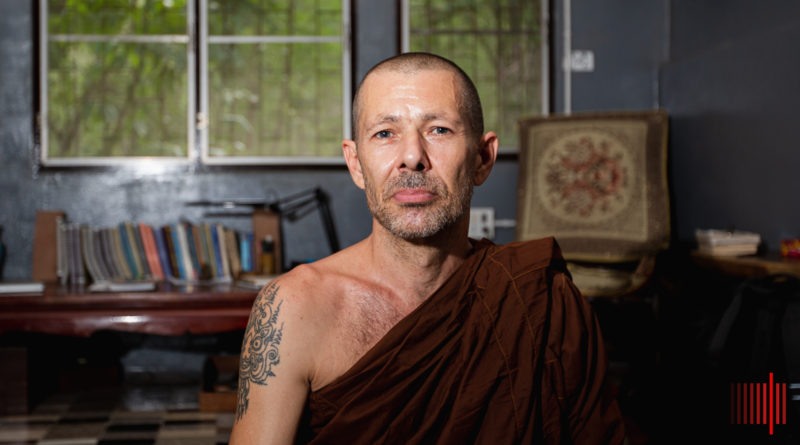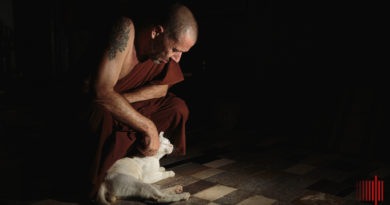Debunking Monking V: Phra Peter, and the Philosopher’s Moan
There’s a formula for how monks are supposed to present Dhamma. It is based on the usual method used by the Buddha himself. For a start, you never start with Buddhism. You don’t just stand up and start declaiming “The Truth”, expecting people to listen, and demanding their belief. You start with a problem. Buddha, teaching face-to-face, would mostly address the problems of his students. I, writing for the mass-media, have no idea what is currently bothering you, so I had to come at it via what had been bothering me, and count on there being enough empathy on your side to see how this stuff can work in the (allegedly) “real world”.
After that, we are supposed to proceed with clear reasoning, inviting questions, and addressing any objections before moving on. I have had to simulate this by the (perhaps slightly insane) means of publicly arguing with my imaginary friends. I hope this has not been too weird, and has been sufficient to anticipate any major queries or objections, and if not then please do drop a comment below, because this is a very important component – Dhamma is always open to question. But I do this a lot anyway. Partly because I am quite weird, and partly because I think it is like good academic practice: as soon as a proposition is formulated the next step is to try to knock it down yourself, and not expand on it until you are confident that it is quite robust. This is necessary to the service of truth – only propagandists and salesmen skip this step.
Finally to conclude with some kind of practice or ethical principle which directly addresses the original problem. This ensures that the Dhamma always remains closely linked to our real lives, rather than descending into some kind of intellectual pastime, or worse – mystical nonsense. Arguably then, I should wrap this up now, having introduced the practice of Samatha meditation in the previous article, but I feel that there are still some loose ends remaining to be tied up, including one rather large one, so these final two articles will attempt to do that.
But why am I feeling a need to lay all this bare? If those are my own guidelines for how to write about Dhamma then why not just shut up and write that way? Well, because I believe keeping a tight focus on the value of Buddhism as a means to address our real existential difficulties to be inseparable from the biggest loose-end I have left lying around. That is the philosophical underpinning of Buddhism, or “what Buddhists believe”, put more simply. So, with a deep breath:
“I teach only the truth of suffering, and the end of suffering”
Samyutta Nikaya 22.86
First, I’ll play for time a little, and employ a favourite tactic of the man himself, which is to start by saying what Buddhism is not.
Buddhism is not a commandment, it’s a recommendation. That’s because “Buddha” is not another name for God. Neither did Buddha claim to be the son of God, prophet, representative, or even servant. There is no special authority claimed for these teachings.
Furthermore, Buddha doesn’t really offer much in the way of perks compared to other religions. He doesn’t hang around hearing prayers or interceding in events. He made no bones about the fact that he was checking out when he died, and it was up to us to carry on – or indeed not – after his death; so you won’t get to hang in his über-cool bachelor-pad in the sky after yours, and you won’t get any points for singing obsequious hymns to him because he isn’t listening. You have to do all the work yourself. He doesn’t even forgive sins.
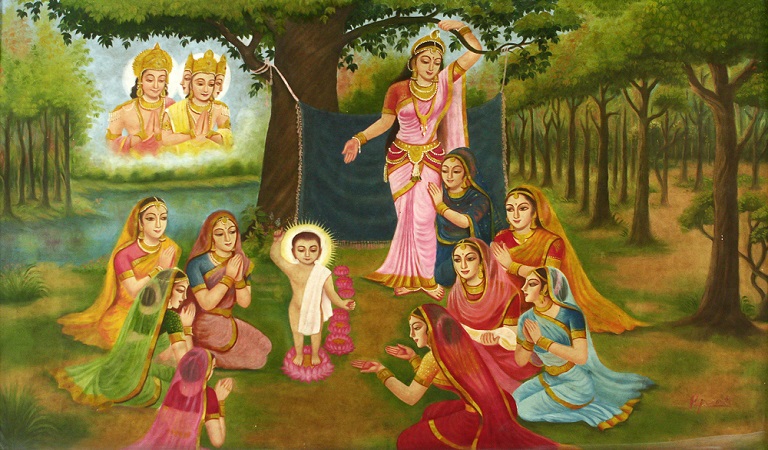
So what’s the deal? Where’s the appeal? And where was the Marketing Department?
Compared to all other major religions, Buddhism is upside-down. It’s a “bottom-up” teaching. It doesn’t begin with a supposed ultimate truth, that the Universe exists because THIS (or that) entity created it, and therefore gets to make the rules. It begins instead with a universal human problem, which requires only observing one’s own experience to confirm, and is perhaps impossible to deny – which is that we aren’t having a very nice time. We suffer. There is suffering. And we don’t like it.
Buddha was simply a person who was troubled by this, and – after investigating them thoroughly – wasn’t impressed by the solutions anyone else seemed to be offering, so he set out to find a better one. He took some time over it, experimenting on himself until he was satisfied that he’d achieved that. He then taught some other people, and left very clear, extensive, and detailed instructions, which he cordially invited everyone else to have a go at, should they too find themselves troubled by the existence of suffering. There is no demand for faith, and no hair-raising threats are made towards the unfaithful.
The instructions are a triple combi of ethics, philosophy, and mental training. The only source for any of Buddha’s views was his own direct perception of reality from a meditative consciousness. The only justification for his doctrines was whether, in real-world testing, such-and-such a practice, action, or principle seemed to tend towards increasing, or reducing, suffering. He never claimed that the teachings were unique or exclusive to him, and in fact arguably the precise opposite – a perhaps somewhat “sciency” view that, if these ideas are indeed the truth of how things work, then they will be independently discoverable, verifiable and repeatable.
Buddhists however, are people who have chosen to take advantage of the very comprehensive structure established by the Buddha, consisting of both the Dhamma, and the Sangha – the community who preserve and practice the Dhamma – in order to manage their own suffering, and to minimise the suffering they inflict on those around them. So, really just to make the world we inhabit, both subjectively and objectively, a better place to be in. And that’s it. That is really all.
Enough buildup already – what did he say?
Buddha had a teaching career that spanned 45 years, and so in that time he generated a lot of content. The essential core, though, as he stated a number of times in the Suttas, is a doctrine called “Ariya Sajja”, the “Noble Truths”.
These were stated in the first formal teaching Buddha ever gave, and they are a fairly concise sequence of 4 linked ideas, with a few bullet-points within those. You could speed-read it in less than five minutes. And I strongly recommend that you do (perhaps a little more thoughtfully) so I’ll provide some links at the bottom to the Sutta source, and to an excellent discussion of it in more everyday language by a wiser and more accomplished monk than me.
Really? All that buildup to just tell you to go and read it somewhere else? Not quite – please bear with me a little. There is another extremely important principle of explaining Dhamma, which is that the only knowledge that has any validity, that you should ever dare to speak of, is that which comes from direct experience. It is always very tempting to push this boundary and repackage things that we have heard wonderful explanations of, but this way we will soon become pretentious at best, fraudulent at worst.
The thing usually called “Enlightenment” (although I tend to prefer to call it “Liberation”) is by one definition – full insight into the Noble Truths. It is what makes Buddha Buddha. So clearly there are levels of subtlety to that which come with practice, but what I can more confidently attempt is to convey how the crudest level of taking these on board lifted me out of the swamp I had sunk into, and started me off on this orange bed-sheet thing that I’m still trying to get the hang of.
In restaurant-napkin-sketch form, the Ariya Sajja look like this:
- There is suffering
- Suffering has a cause – craving
- Suffering has an end – the extinction of craving
- The extinction of craving can be accomplished by restructing one’s worldview, thinking patterns, speech, actions, way of supporting oneself, effort, mindfulness, and concentration.
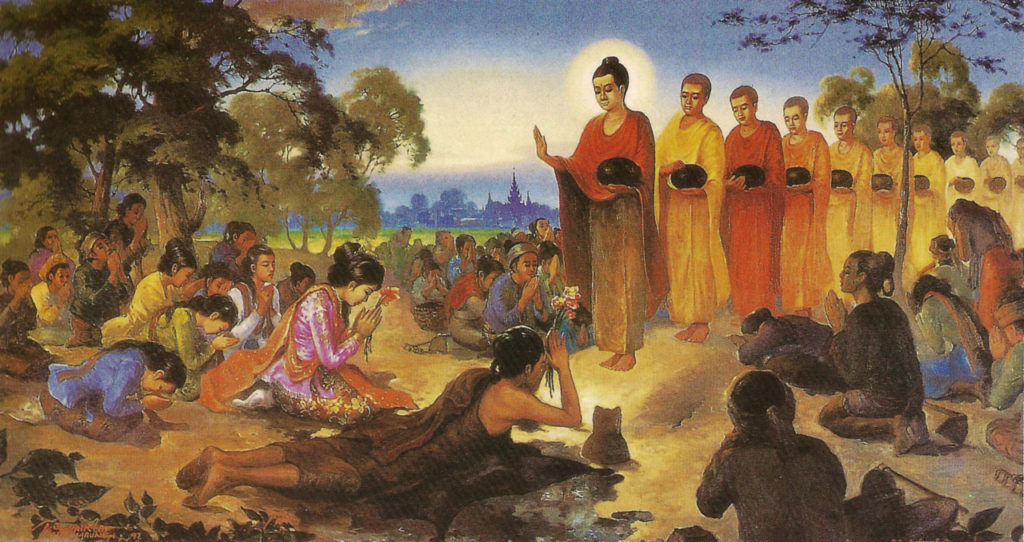
To a recently quit drug addict, this all looked highly applicable. Initially, I thought “gosh – so that’s the Buddhist approach to recovery, how very sensible” but was quickly corrected to understanding that this is, in fact, Buddhism. This happy fit is no coincidence though, since I think that taking drug-addiction as a metaphor, or microcosm, of how Buddha saw the entire human condition and what makes it difficult, and how most of our attempts to ease it are self-defeating – holds up pretty well. No wonder then, that it (or one of its non-chemical cousins – porn addiction, eating disorders, et al) seems to be the first thing we reach for when life isn’t going so well in general.
But I have said more than enough about drugs, let us return to the more universal. So – “There is suffering”, is there? That is the big reveal? Really?
Yes, really. It is a massive reveal, when we look through the lens of Sajja – we can say that we perceive something, but do we act as if it were true?
Applied science, darlings
I realised that the Ariya Sajja seemed to follow a template that already existed in my mind for explaining misery and what to do about it. “Ignoble Truths”, if you will. If I reverse-engineered my existing beliefs from my actual behaviour, then my version of the first Truth was that really I thought my life (at least) should not contain suffering. For that reason, anytime I became aware that I was displeased about something, deep down on some level I felt it to be an outrage, a gross injustice, and an emergency. This made me terribly narcissistic, and morally flawed.
Naturally, of course, if you had some theoretical gathering of people, and all of them were absolutely fine except one who was having a very difficult time, then civilised and compassionate people would prioritise that person’s needs and expect less of them. Forgive them if they seemed a bit self-centred, mean, or irritable. The problem comes when everyone in the room thinks that they are that person. If I’m acting nasty, then I’m very quick to see that it’s because I’m under all this stress, whereas if you are, then I’ll be very quick to see that it’s because you’re a worthless bastard.
So I tried to take that on board, and it seemed to work very well for considering moral questions in a vacuum and feeling like I was already a better and wiser person. But then things would come up – external annoyances or internal longings, and I would be immediately in the grip of them, feeling very hard-done-by and very special, because things were hard for ME, yes – MY life contained suffering, so what are all of YOU going to do about that? Then I would catch myself with the self-pity and remind myself that I was wise now.
But this is where we need to connect the world of ideas, with the world of action, or we become what Nietschze called “Bloodless Scholars” who are terribly wise and good right up until the point that something actually happens. But that is very hard to do, because thinking is relatively slow compared to other things that come up and start directing your reactions. This is where the crucial link between philosophy and mental training comes in.
What, then, do we do wrong?
Remember the gruesome triplets? Lobha, Dhosa, Moha; Greed, Hatred and Delusion (collectively called “Kilesa”, by the way). I began to see them as arising to patch over my denial of the first Noble Truth. My life should not contain suffering.. but IT DOES! So what do I need to get, destroy, or lose myself in? Here are some popular alternative “Ignoble Truth” life-strategies involving Kilesa:
Lobha (Greed)
Life contains some suffering, so the trick is to make sure that most of it is happening to someone else. Be one of the lucky ones, if you weren’t born lucky then get lucky – get more than other people, buy pleasure, buy security, love, respect.
The biggest problem with this is that obviously only a minority of people can be better-off than most people, so most of the Lobha-players end up despising themselves as losers. But it’s not all great for the winners either: the continued round of expectation/disappointment as whatever longed-for gain fails to satisfy tends to produce insatiable greed (which, ironically, feels a lot like poverty). The NEXT million, that’s the one. Tends to produce envy – looking around at other successful people who we imagine to be enjoying their lives as much as their flamboyant displays suggest, and resenting them. Tends to produce a terrible fear of ageing and death – all this gets taken away.
It’s surely no coincidence that so many rich people become obsessed with eternal life – cryogenics, becoming reclusive germaphobes, even superstitious witch-doctory. And you need to be young or at least fit to enjoy all of this – Botox, Viagra, and monkey-glands will only get you so far.
Dhosa (Hatred)
Life is full of suffering because of YOU! THAT! Whatever it is, that when it goes away, I will revert to a tranquil and happy state. Racism can be a great example of this. Fondly imagining some idyllic Shire full of genetically similar Hobbits who are all really nice to each other, and nothing need be done to create the perfect society except to identify the people who don’t belong in it by a crudely obvious visual marker. Very attractive fantasy – obviously far easier to dream of that than to actually get down to the dirty, exhausting work of dealing with the real complexities of why people of all kinds are often not very nice to each other and can’t get on. Perhaps doubly attractive when you know that it can’t really ever be achieved, certainly not in somewhere like modern Britain, so you can just carry on spitting out Dhosa forever, and it isn’t your fault.
Ironically though, progressive politics, in opposing this kind of stuff, sometimes tips over into a similar thing. All misery is the result of a number of easily identifiable “-isms”, and we just need to hunt those down and exterminate them to create Utopia. Again, it couldn’t be that easy – hateful beliefs are just a handy peg to hang Dhosa on. If you educate all the racists, do they suddenly become nice? Probably not. All that Dhosa has to go somewhere, and there are plenty of countries with little diversity that demonstrate people’s ability to despise and exploit their fellow Hobbits. Those kind of explode both fantasies at once.
Moha (Delusion)
Life is pretty rough sometimes. Maybe if I’m stoned enough I won’t notice or mind too much (my personal fave). Or any other way in which I’m not really here because my consciousness is bound up in some other reality – gamer world, polishing my perfect social-media alter-ego facetuned to oblivion. Being obsessed with strange theories that don’t really make any difference to anything – if the world is actually flat, but apparently I can get around it by acting as if it was round because of some weird scientific anomalies, well.. okay. Or the moon landings – I hope they were real because it’s a better story, but if they weren’t… well, it was still a good story. Very exciting when I was a kid, but I just watched it on TV.
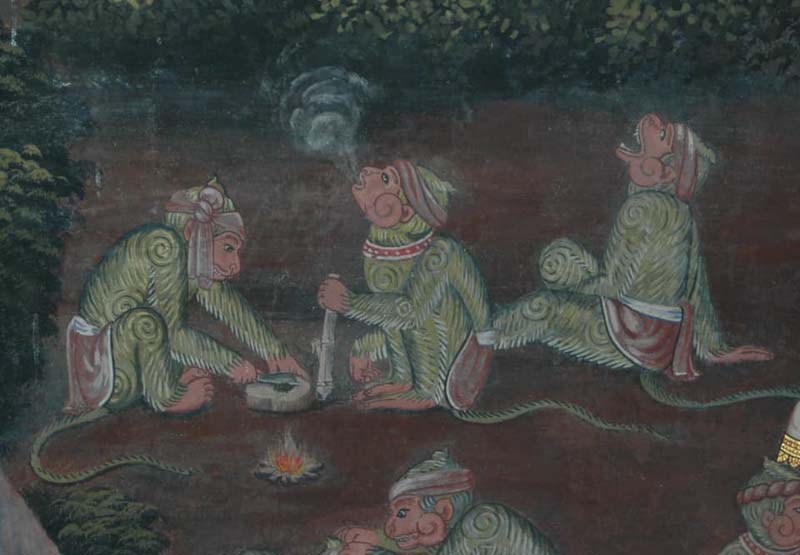
To be clear – there’s nothing wrong with prosperity, or righting wrongs, or pleasant diversions. If something is within your purview that you can change for the better, then by all means change it. If your neighbour’s radio is drifting in through your window and you don’t like it then close the window. But so often we see that Dhosa still keeps griping about how inconsiderate he was and part of us would actually like him to turn it up again, so we can again indulge in the madness that we would enjoy perfect happiness if not for HIM, because just stopping the noise didn’t satisfy us like we thought it would. That’s a good example of a real-world situation where we can observe Kilesa at work.
But another, which can be done any time, in (almost) any circumstances, and with no equipment, is meditation. Watching those poisons float around, looking for something to clutch hold of, getting to know their taste and smell, and seeing the insanity of pure desire with no object, pure hatred, pure delusion. Seeing them before they find an object and then immediately start writing the script that you have to mindlessly act out.
This is a power called “Mindfulness”. This is the muscle that is built in regular meditation practice, and that we can take out into the world to unify our perceptions, our principles, and our responses to actual events. Heart, word, and action. Mindfulness maintains integrity – Sajja. It helps us to remember who we are, when it matters, which is when suffering arises.
Yes – there is suffering. Accept that, but not just intellectually – actually see it, and stop acting surprised when it shows up, and a lot of this madness will start to calm down. Yes – bad things happen. For many people in this world, they happen from the day they are born, and don’t look up much thereafter. If you’re one of the lucky few who ducks most of that, and maybe even has a lot of good things happen, then that all gets taken away in the end, and that will hurt. It gets you either way, and that has to be looked square in the face, or madness results.
That pain lurks at the heart of existence. Think of a child who suffered some awful trauma, which left physical or psychological harm. They grow up, they get angry about it. Lobha tells them to seek financial damages, Dhosa tells them to seek revenge, Moha tells them to bury it in PTSD or worse – some twisted worldview that normalises it, probably by doing similar things themselves. None of those will undo the damage. All of those will in fact tend to make the suffering worse, as their continued failure to cancel the first Noble Truth usually encourages them go further – More! Meaner! Madder! Yes – it’s kind of like drug addiction, even though I said I wasn’t going to talk about that anymore. .
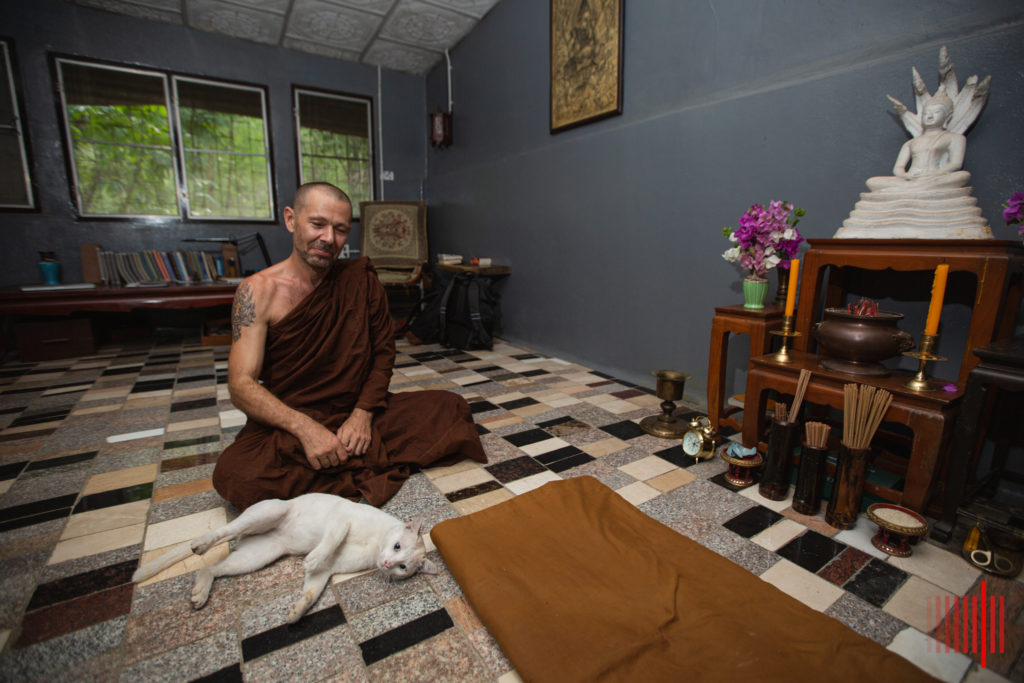
So that’s my take on the First Noble Truth. I’m not going to go much further with this for reasons already made clear about staying well within direct experience of practice and results when talking about this stuff. I’ll leave it to others to explain the further ramifications of Ariya Sajja and just say that that was how they hit me when Phra Hans explained them, and those views have been serving me well for the best part of two decades, helping me transform from somebody who at one time couldn’t endure much without being full of anaesthetics, or achieve much without being full of stimulants, into at least.. someone who maybe can. So if that contains any technical doctrinal errors, well – like the moon landings – okay, then.
I’ll just touch briefly on the second Truth though, because it can look a bit harsh on the face of it. It’s all because of craving? It’s all your fault? It’s all just something you could stop by stopping something that you are doing? Yes it’s a subtle point and I refer you again to Buddha et al for a fuller explanation, but I’ll just say this, and it isn’t my insight, it’s adapted from the magnificent Ajahn Sumedho, but I think I have lived with this one long enough to be able to say in my own words:
These are “Noble” truths. That means something very specific, not just that they are awesome, or something vague like that. Seeing the world this way is what makes you noble, and that is what it will take to transcend the suffering in this world, and not become another traumatised perpetrator of more horrors, or a whining eternal victim. You can just say “It’s random”, “it’s not fair”, “I’m no worse than..”, “this is the way things are, buddy”, and you could make a case for all those being truths. Okay, live those ignoble truths, swim in the sea of suffering. But I’m not saying that contemptuously or cruelly – far from it.
These ideas can be misused – to look at another person who is overwhelmed by their difficulties, and glibly say that they could easily end suffering by following these simple instructions is obviously monstrous. We are talking here only about how we must view our own suffering in order to not be enslaved by it. The more we have, the more noble we must be. There is no other way.
Being noble is often not an easy choice, or it wouldn’t be called noble, it would be called “common”. There is much that we cannot have power over, so you see what remains that we can. You can choose to reject self-pity, narcissism and the intoxicating madness of Kilesa. You can take responsibility for what you can change, and what you can’t – you can see that everyone is subject to that, so you can extend your compassion and that brings an unexpected blessing: Compassion makes our individual suffering easier to bear because we see that we are all in this leaky boat together. There is Suffering.
So – suck it up, sire, and try to be a bit nicer to each other.
About the author

Phra Peter Suparo
History geek. Enjoys sitting around doing as little as possible. Semi-retired bon viveur. Eternal student. Elf-friend. Theoretically in favour of humanity.

